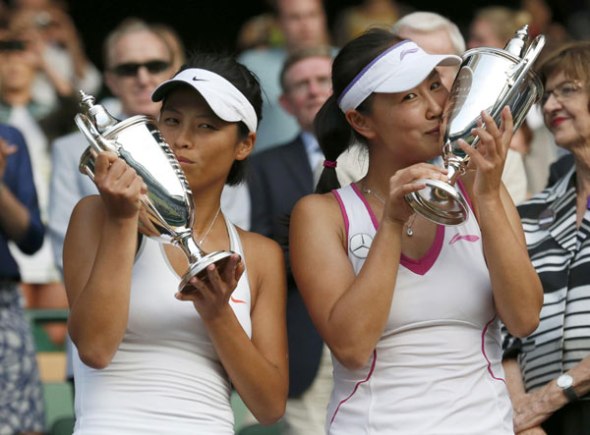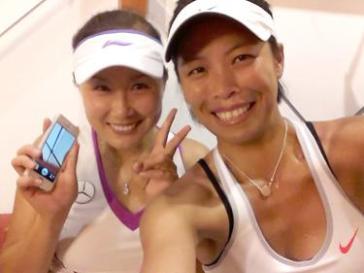The big news from the tennis world this weekend was not, of course, Andy Murray becoming Britain’s first winner of the men’s Wimbledon title for 77 years, but China’s Peng Shuai teaming up with Hsieh Su-wei from Taiwan to win the women’s doubles title. Taiwanese media pointed out that President Ma Ying-jeou, Vice President Wu Den-yih, Premier Jiang Yi-huah and Minister of Education Chiang Wei-ling all sent Hsieh congratulatory telegrams (telegrams?? in 2013??).

It’s not known whether their various Chinese counterparts sent Peng similar messages, since most Chinese media outlets just went with a series of pictures of their victory, missing out on an obvious opportunity to say how wonderful cross-strait ties are.
After the match, things got a little testy. Hsieh answered one question in the press conference about what the win would mean to Taiwan, but when a Japanese reporter asked a follow-up question – again directed to Hsieh – about what it would mean to her country, Peng interrupted and blocked the question, saying that she could not accept the statement that Taiwan is a country.
Hsieh, meanwhile, later claimed on Facebook that she wasn’t getting involved, writing “I’m not playing political games with you. Sports are sports.” But she did thank the President (and she wasn’t referring to Xi Jinping) for supporting her.
Taiwanese companies might want to start supporting her too. The Taipei Times, admittedly not known for its love of all things Beijing, reports that Hsieh’s father claimed a Chinese company had offered a 10 million yuan ($1.6 million) annual sponsorship deal to his daughter to have her play in China’s National Games, for which of course she would need Chinese citizenship.
Taiwanese golfer Yani Tseng has faced similar offers in the past, though the 24-year-old has earned close to $10 million so far on the LPGA Tour, more than enough to be able to ignore the mighty yuan. Hsieh, however, has earned about a fifth of that over a far longer career, and struggles financially because she funds her younger siblings to be able to play in pro tournaments. Hsieh currently has two endorsement deals, worth a total of just $50,000 a year.
 Peng and Hsieh are good friends who first paired up at the junior level and have won several pro tournaments together, but there’s no suggestion Peng is campaigning for Hsieh to convert. At some point, you would imagine a Taiwanese athlete will take the money, though it would be surprising if Hsieh is the
Peng and Hsieh are good friends who first paired up at the junior level and have won several pro tournaments together, but there’s no suggestion Peng is campaigning for Hsieh to convert. At some point, you would imagine a Taiwanese athlete will take the money, though it would be surprising if Hsieh is the first next [2005 world pool champion Wu Chia-ching made the switch in 2011]. Equally, Chinese companies aren’t going to offer the big bucks unless that athlete is truly world class (Hsieh has been ranked in the top 25 for singles and the top 10 for doubles).
 UPDATE: Taiwanese sports fans can now breathe a sigh of relief as it doesn’t look like Hsieh Su-wei will be playing for China anytime soon. Hsieh is now reportedly set to sign an endorsement contract with the Taiwan Tobacco and Liquor Co. (TTLC), the parent company of Taiwan Beer, in a deal worth close to $170,000 a year. Under the terms of the agreement, Hsieh will sport the Taiwan Beer logo while playing and will also feature in commercials for the company. Hsieh said she was happy to endorse Taiwanese companies and wished for more of them to sponsor (presumably Taiwanese) athletes so they have an easier time pursuing their professional careers.
UPDATE: Taiwanese sports fans can now breathe a sigh of relief as it doesn’t look like Hsieh Su-wei will be playing for China anytime soon. Hsieh is now reportedly set to sign an endorsement contract with the Taiwan Tobacco and Liquor Co. (TTLC), the parent company of Taiwan Beer, in a deal worth close to $170,000 a year. Under the terms of the agreement, Hsieh will sport the Taiwan Beer logo while playing and will also feature in commercials for the company. Hsieh said she was happy to endorse Taiwanese companies and wished for more of them to sponsor (presumably Taiwanese) athletes so they have an easier time pursuing their professional careers.
[Also published at Caixin and Market Watch]


6 thoughts on “Wimbledon win sparks Taiwan-China controversy [UPDATED]”